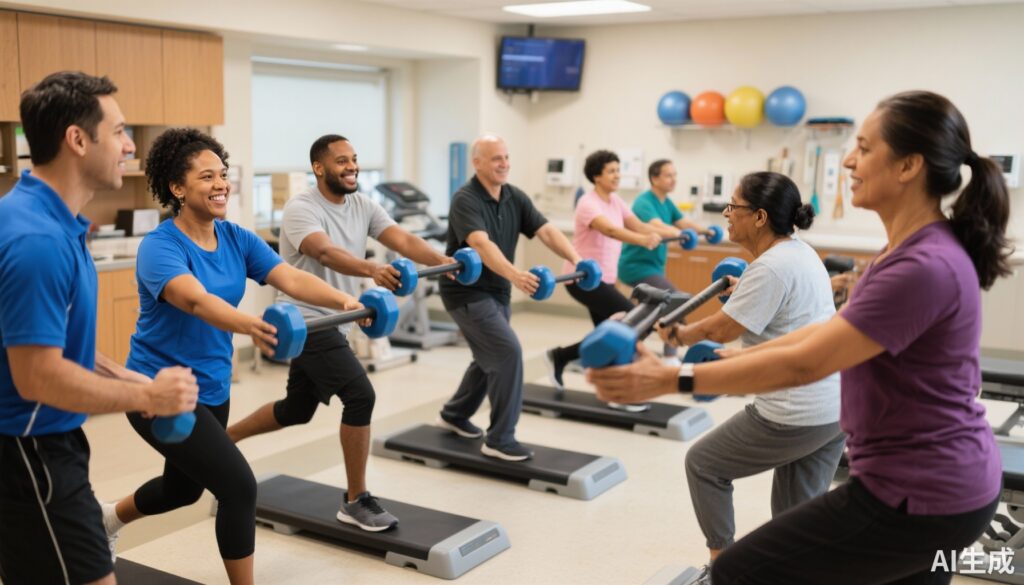Background: Disease Burden and Clinical Context
Kidney transplant recipients (KTRs) face a persistently high risk of cardiovascular disease (CVD), which remains the leading cause of morbidity and mortality in this population. Despite successful transplantation, KTRs often experience adverse changes in physical fitness, including reduced cardiorespiratory fitness (CRF) and unfavorable alterations in body composition such as increased fat mass and decreased lean muscle. These physical impairments contribute to their elevated CVD risk and impair health-related quality of life (QoL). Current post-transplant guidelines emphasize the importance of maintaining physical activity; however, the optimal exercise regimens and the magnitude of benefit remain inadequately defined. This updated systematic review and meta-analysis synthesize randomized controlled trial (RCT) data to evaluate the efficacy of physical activity interventions in adult KTRs, thereby guiding clinicians toward evidence-based recommendations.
Study Design and Methods
This review extends a prior meta-analysis by incorporating seven additional RCTs published between March 2021 and September 2024, culminating in a total of 23 RCTs encompassing 1,139 kidney transplant recipients. The median duration of interventions was 12 weeks, with participants engaging in exercise sessions ranging from two to seven times per week. Exercise protocols typically combined aerobic and resistance training modalities, though significant heterogeneity existed in intervention specifics, intensity, and adherence reporting.
Measured endpoints included cardiorespiratory fitness (expressed as peak oxygen uptake, V̇O2peak), muscular strength, blood pressure, body composition metrics (lean mass and bone health), heart rate, lipid profiles (notably high-density lipoprotein, HDL), kidney function parameters, and health-related quality of life assessments.
Key Findings and Clinical Significance
The pooled analysis demonstrated statistically significant improvements in several clinically important outcomes:
- Cardiorespiratory Fitness: An increase in V̇O2peak by 3.87 mL/kg/min (p = 0.0004) was observed. Given that increments in V̇O2peak are strongly linked to reduced cardiovascular mortality in various populations, this finding holds meaningful implications for CVD risk mitigation in KTRs.
- Physical Function: Sit-to-stand performance improved by an average of 7.72 repetitions over 60 seconds (p = 0.0001), indicating enhanced strength and functional mobility, which are pivotal for independent living and reduced hospitalization risk.
- High-Density Lipoprotein (HDL): HDL cholesterol levels increased by 0.13 mmol/L (p = 0.02). As HDL is inversely related to atherosclerotic risk, this improvement aligns with potential reductions in cardiovascular events.
- Additional Outcomes: Isolated studies reported increases in muscle strength, bone mineral density, lean body mass, and quality of life domains, though these findings were less consistent across trials.
Despite these encouraging outcomes, all included studies were characterized by moderate to high risk of bias, predominantly due to small sample sizes, lack of blinding, and heterogeneity in intervention delivery and adherence monitoring. This methodological variability limits the strength of causal inferences.
Expert Commentary and Mechanistic Insights
Physical activity has well-established benefits on vascular health, metabolic regulation, and muscular endurance — all critically relevant to KTRs, who experience accelerated vascular aging and metabolic disturbances post-transplant. Aerobic exercise improves endothelial function and insulin sensitivity, while resistance training combats sarcopenia and supports bone integrity, potentially mitigating the high fracture risk observed in this cohort.
Current evidence, while promising, highlights significant gaps. The absence of long-term data restricts understanding of sustained benefits and effects on hard outcomes such as cardiovascular events and graft survival. Furthermore, variability in intervention type and intensity precludes firm conclusions regarding optimal exercise prescriptions.
Clinical guidelines increasingly advocate for individualized exercise regimens tailored to the recipient’s fitness level, comorbidities, and transplant timeline, underscoring the importance of multidisciplinary support including physiotherapists and transplant specialists to enhance adherence and safety.
Conclusions and Future Directions
This comprehensive update confirms that physical activity interventions confer meaningful benefits in adult kidney transplant recipients, particularly elevating cardiorespiratory fitness and HDL cholesterol — key factors associated with cardiovascular risk reduction. The improvements in physical function further suggest enhanced patient independence and quality of life.
Nevertheless, the evidence base remains constrained by methodological limitations and short-term follow-up. Future large-scale, longer-duration RCTs with rigorous designs are critical to clarify optimal exercise modalities, dose-response relationships, and sustained clinical outcomes. Enhanced standardization in intervention reporting and adherence assessment will also strengthen translational impact.
In clinical practice, incorporating structured exercise programs as an integral component of post-transplant care offers a promising strategy to combat cardiovascular risk and improve overall health in KTRs. Shared decision-making with patients to tailor activity plans, along with ongoing monitoring, may maximize these benefits and support long-term transplant success.
Funding and ClinicalTrials.gov Enrollment
No specific funding sources were reported for this meta-analysis. Readers are encouraged to consult clinical trial registries for ongoing studies investigating physical activity interventions in kidney transplant recipients for emerging evidence.
References
Billany RE, Bishop NC, Castle EM, et al. Physical activity interventions in adult kidney transplant recipients: an updated systematic review and meta-analysis of randomized controlled trials. Ren Fail. 2025 Dec;47(1):2480246. doi:10.1080/0886022X.2025.2480246. Epub 2025 Mar 27. PMID: 40148080; PMCID: PMC11951324.
Additional relevant literature includes recent clinical practice guidelines and research on exercise physiology in immunosuppressed populations published in nephrology and cardiology journals.


